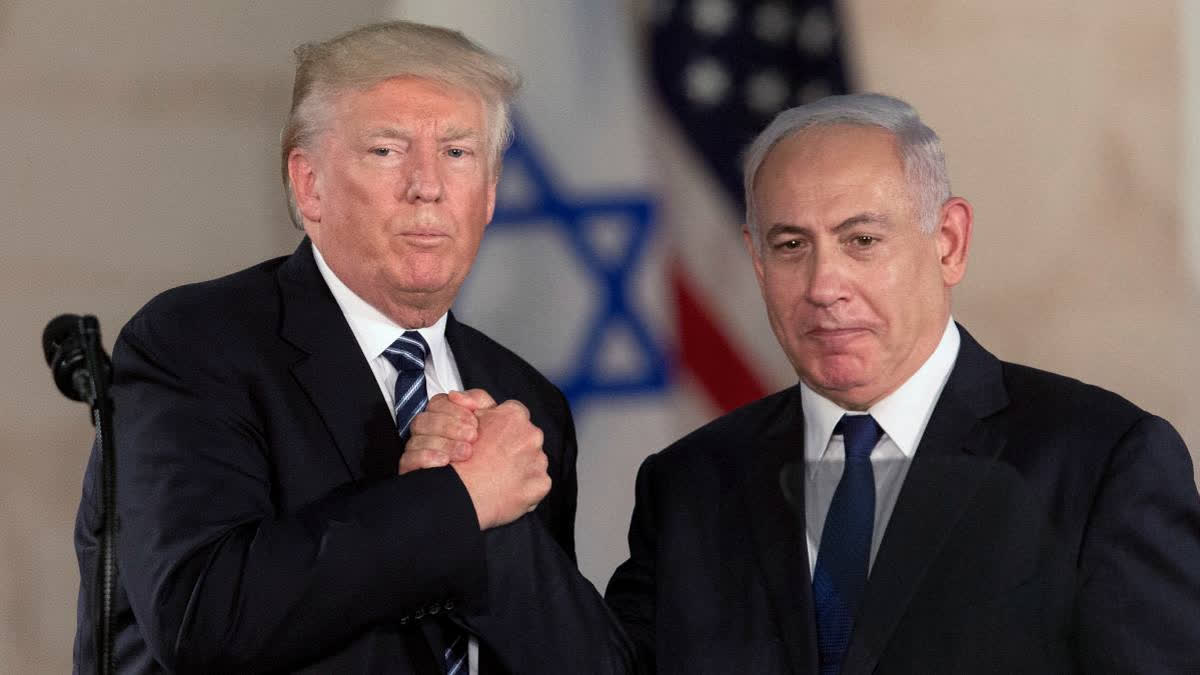Jerusalem: Israel launched fresh strikes on south Beirut early Thursday, hours after Prime Minister Benjamin Netanyahu and US president-elect Donald Trump spoke about the "Iranian threat".
The Israeli premier was one of the first world leaders to congratulate Trump, calling the re-election "history's greatest comeback".
Over the phone on Wednesday, the pair "agreed to work together for Israel's security" and "discussed the Iranian threat", Netanyahu's office said in a statement.
Not long afterwards, the Israeli military launched its latest strikes on Iran-backed Hezbollah's main bastion of south Beirut, with AFP footage showing orange flashes and plumes of smoke over the densely populated suburb.
The Israeli army had issued evacuation orders ahead of the strikes, calling on people to leave four neighbourhoods, including one near the international airport.
In Lebanon's east, the country's health ministry said Israeli strikes on Wednesday killed 40 people, with rescuers combing the rubble for survivors.
"The series of Israeli enemy strikes on the Bekaa Valley and Baalbek" killed "40 people and injured 53", the ministry said in a statement.
Hezbollah had pledged the result of the US election would have no bearing on the war, which escalated in September as the Israeli military widened its focus from Gaza to securing its northern border with Lebanon.
In a televised speech recorded before Trump's victory but aired afterwards, new Hezbollah chief Naim Qassem said: "We have tens of thousands of trained resistance combatants" ready to fight.
"What will stop this... war is the battlefield," he said.
Qassem, who became Hezbollah secretary-general last week, warned that nowhere in Israel would be "off-limits".
Hezbollah announced Wednesday it had Iran-made Fatah 110 missiles, a weapon with a 300-kilometre (186-mile) range that military expert Riad Kahwaji described as the group's "most accurate".
The group claimed a slew of attacks on Israel on Wednesday, including two that targeted naval bases near the Israeli city of Haifa and two near commercial hub Tel Aviv.
Hezbollah began its low-intensity cross-border campaign last year in support of ally Hamas after the Palestinian militants' October 7 attack on Israel.
Israel escalated its air raids on Hezbollah strongholds in south Lebanon, Beirut and the eastern Bekaa Valley from September 23, sending in ground troops a week later.
More than a year of fighting in Lebanon has killed at least 3,050 people, the health ministry said Wednesday.
Trump's return
Efforts to end the conflicts in Gaza and neighbouring Lebanon have so far repeatedly failed.
While US President Joe Biden's administration has piled pressure on Netanyahu to agree to a truce, Washington sustained its political and military backing of Israel.
Many see Trump's White House return as a possible boon for Israel.
All US presidents "are in favour of the State of Israel", a man in east Jerusalem told AFP, asking to be identified only by his nickname Abu Mohammed.
Under Trump, "nothing will change except more decline".
During his campaign, Trump touted himself as Israel's strongest ally, going so far as to say Biden should let Israel "finish the job" against Hamas in Gaza.
"Trump's return to power... will lead us to hell and there will be a greater and more difficult escalation," said a school principal in the West Bank city of Ramallah.
Recent surveys have shown that a majority of Israelis, 66 percent according to one conducted by Israel's Channel 12 News, were hoping to see Trump triumph.
Analysts said Netanyahu also wanted Trump's return, given their longstanding personal friendship and the American's hawkishness on Iran.
During his first term in office, Trump moved the US embassy to Jerusalem, recognised Israeli sovereignty over the occupied Golan Heights and helped normalise ties between Israel and several Arab states under the so-called Abraham Accords.
But some experts cautioned against prematurely assuming Trump's position on "Israel's treatment of Palestinians".
"It's not necessarily clear that he would kind of just stand aside while Israel continues to de facto annex the West Bank," said Mairav Zonszein from the International Crisis Group.
'Nothing left for us'
Egypt, the first Arab state to sign a peace deal with Israel and one of the mediators in the stymied Gaza truce talks, also congratulated Trump.
President Abdel Fattah al-Sisi told Trump in a call that Cairo would work with him "to contribute to stability, peace and development in the Middle East".
In Gaza, where the war has displaced most residents, caused widespread hunger and death, and devastated hospitals, some clung to hope with a change in the US administration.
"There's nothing left for us, we want peace," said 60-year-old Mamdouh al-Jadba, who was displaced to Gaza City from Jabalia.
The UN said Wednesday its polio vaccination campaign in Gaza had ended, with more than half a million children vaccinated despite the war.
Hamas's October 7, 2023 attack that started the war resulted in 1,206 deaths, mostly civilians, according to an AFP tally of Israeli official figures.
Israel's retaliatory campaign has killed 43,391 people in Gaza, a majority of them civilians, according to figures from the Hamas-run territory's health ministry, which the United Nations considers reliable.
